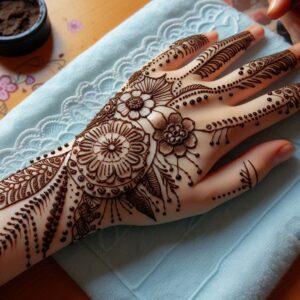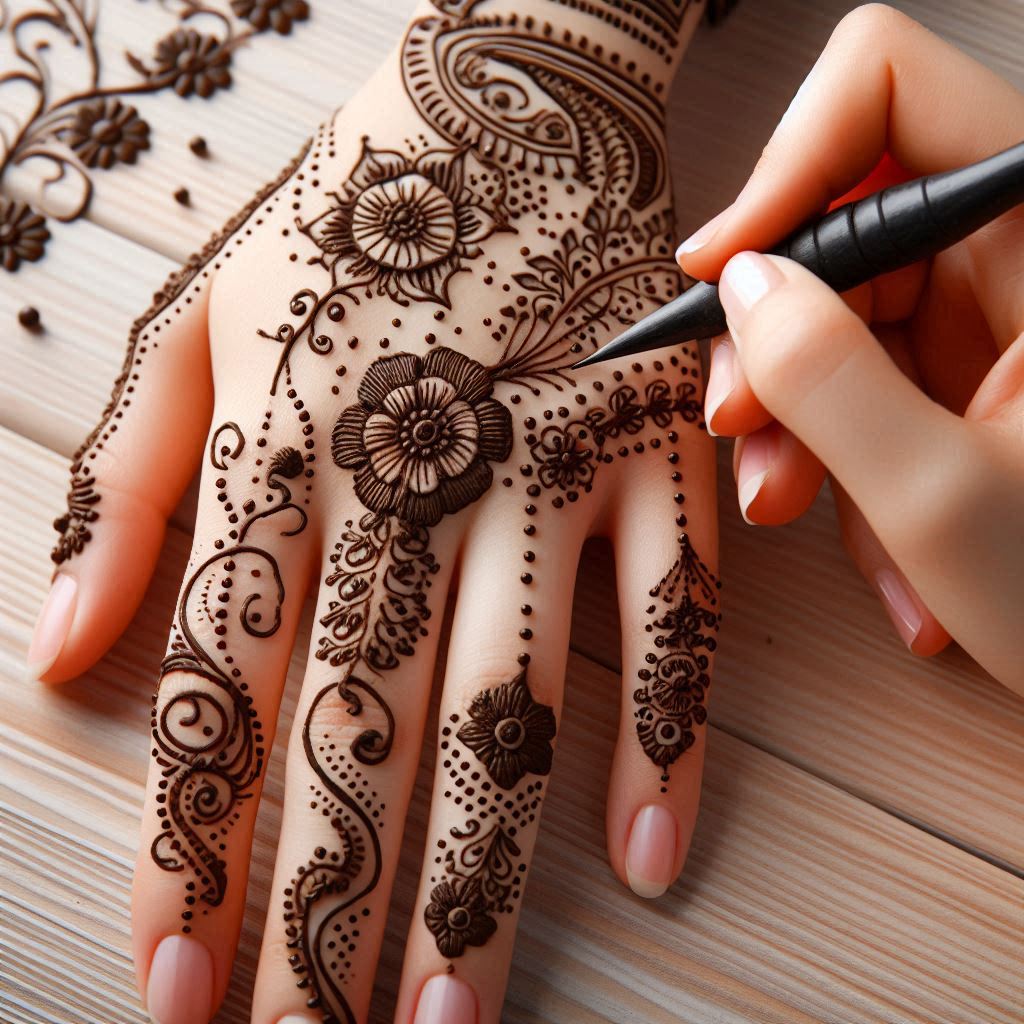Left Hand Mehndi Design Back: A Reflection on Simplicity and Artistry
In the kitchen, as in life, we often hear the phrase: “less is more.” It’s a saying that holds true in both the culinary arts and in the art of Mehndi, especially when considering the back of the left hand. This space, like a clean plate ready for its first touch of flavor, offers a canvas where even the simplest designs can carry deep meaning and beauty. As someone who has spent years perfecting the art of flavor, I’ve come to appreciate how restraint, balance, and small details can make the biggest impact. And as I reflect on Mehndi, I realize that the same principles apply.
The left hand, often seen as the hand of reflection and receptiveness, holds a quiet power. While it may not be as dominant as the right, it carries its own grace – a subtlety that speaks volumes without needing to shout. The Mehndi designs that adorn the back of this hand often follow the same philosophy: they are understated, elegant, and full of meaning.
The Beauty of Balance
I often think about how a well-balanced dish needs just the right amount of spice, acidity, and richness. Too much of one thing, and the balance is thrown off. Similarly, the beauty of a Mehndi design lies in its balance – between detail and space, between bold strokes and fine lines. On the back of the left hand, this balance becomes even more important because it’s a space that doesn’t demand attention but, when adorned with care, can draw the eye in the most delicate way.
Take, for example, a simple vine design on the back of the left hand. The vine starts at the wrist and gracefully winds its way up toward the fingers, with small leaves or flowers decorating its path. It’s not overly elaborate, but each curve and detail has been carefully considered. Much like a well-executed dish, where every ingredient has its place, the Mehndi artist must know where to add and where to leave space.
I find this philosophy echoed in my own life and work. There’s a joy in knowing when to stop, in appreciating the beauty of simplicity. In a world that often pushes us toward excess – more flavor, more color, more everything – there’s a certain wisdom in stepping back and allowing the essential elements to shine.




Simplicity is the Hardest Art
As a chef, I’ve often found that the simplest dishes are the hardest to perfect. A perfectly cooked egg, for example, may seem basic, but it requires precision and care to get it just right. The same holds true for Mehndi designs. While an intricate, full-hand design may impress with its complexity, a simple design on the back of the left hand carries a different kind of beauty. It whispers rather than shouts, inviting those who notice to appreciate its details.
The subtlety of a simple Mehndi design is not a lack of creativity – rather, it is a showcase of control and mastery. The artist must know exactly how much is enough, how to create beauty without overwhelming the natural form of the hand. This is something I’ve learned over years in the kitchen: to trust in simplicity, to allow the natural flavors to speak for themselves.
There’s also a certain elegance in the act of receiving – much like the left hand itself, which is often associated with receiving energy, blessings, and sustenance. A simple Mehndi design on this hand reflects that idea of receptivity – it’s open, ready to accept, without needing to embellish too much. It reminds me of the joy I find in presenting a dish, knowing that the person receiving it will appreciate not only the flavors but the care that went into its creation.



The Power of the Small Things
In both Mehndi and food, it’s often the smallest details that make the biggest impact. A single swirl, a carefully placed leaf, or a well-executed line can transform a design from ordinary to extraordinary. Similarly, in cooking, a pinch of salt or a squeeze of lemon can elevate a dish, bringing it to life in unexpected ways. The key is knowing when and where to add these details.
When I look at a simple Mehndi design on the back of the left hand, I see not just an artistic expression but a reminder of life’s small joys – the moments that, while often overlooked, hold immense significance. A design doesn’t need to be elaborate to be meaningful; it just needs to be thoughtfully created.
This is true in the kitchen as well. The simplest meals – a freshly baked loaf of bread, a perfectly brewed cup of chai – can bring the greatest satisfaction. It’s not always about complexity; it’s about the thought and care behind each action. The same applies to Mehndi – each line, each curve is drawn with intention, creating a design that is both subtle and profound.
Conclusion: The Joy of Simplicity
At the end of the day, whether in the kitchen or through Mehndi, simplicity is an art form in itself. The back of the left hand, when adorned with a simple Mehndi design, becomes a canvas for quiet beauty, a space where elegance and restraint come together in perfect harmony.
As a chef, I’ve come to realize that the most memorable experiences often come from the simplest things – a well-crafted dish, a thoughtful design, a meaningful conversation. And in the world of Mehndi, this simplicity speaks volumes. It reminds us that beauty doesn’t always need to be loud or complex. Sometimes, the quietest designs carry the most weight.
Keep Exploring the Subtle Art of Mehndi:
- Right hand Mehndi design front– Dive into the elegance of front-hand Mehndi designs, where each line is drawn to highlight the natural movement and beauty of the hand.
- Mehndi designs full hand left– Discover how full-hand Mehndi designs on the left hand create a stunning balance between tradition and modern artistry.


